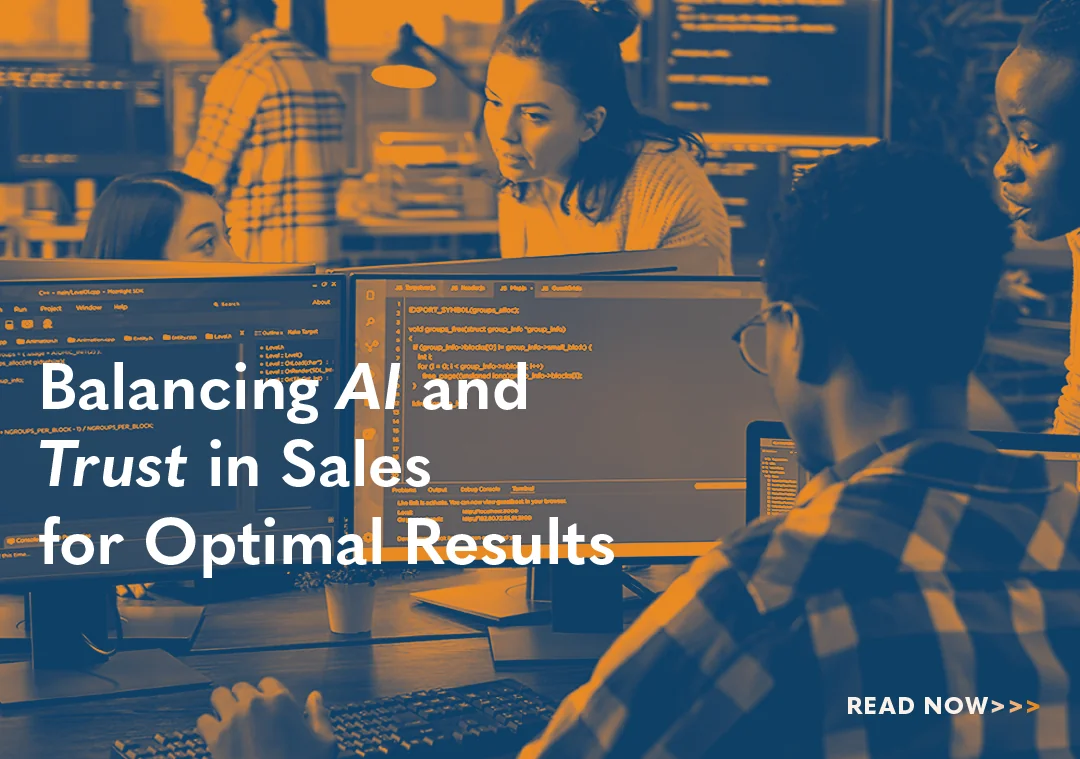The Impact of AI on Sales Professionals

Artificial Intelligence (AI) in sales can be both an asset and a liability for professional salespeople. It promises efficiency and personalized interactions yet raises fears of job displacement. This dynamic interplay prompts a critical question: can sales AI and human sales expertise coexist harmoniously? The future of sales lies in amplifying human capabilities with automation, not replacing them. It demands upskilling and adaptability, ensuring sales professionals not only survive but thrive in this automated era. This article explores the changing relationship between sales professionals and sales AI.
The Case for Artificial Intelligence
Analysts at Gartner predict, “By 2026, 65% of B2B sales organizations will transition from intuition-based to data-driven decision making, using technology that unites workflow, data, and analytics.” Artificial Intelligence in sales is a transformative force, promising heightened efficiency and precision in a rapidly evolving selling landscape.
AI in sales refers to using sophisticated algorithms and analytical tools to automate and enhance various aspects of sales operations. By leveraging advanced technologies, sales teams can streamline routine tasks, such as lead qualification and data analysis, allowing professionals to focus on higher-value client-engaging activities.
Sales AI translates to accelerated sales cycles and improved customer relationship management, with personalized interactions at scale. Sales AI harnesses the power of data-driven insights, offering businesses a competitive edge through sharper forecasting and trend analysis. As a result, sales professionals equipped with these tools are better positioned to anticipate and meet the dynamic needs of their clients.
Moreover, sales AI nurtures a culture of proactive engagement. Sales reps can discover and reach potential clients with precision and relevance through targeted marketing automation and intelligent prospecting. Proactive engagement maximizes the impact of outreach efforts and creates a more satisfied and engaged customer base. This can lead to higher conversion rates for sales reps and increased revenue streams.
Additionally, automation tools enhance the accuracy and accessibility of critical sales data, empowering teams to make more informed decisions. It will also help sales managers identify what skills sales reps are underperforming at. By automating routine administrative tasks, sales professionals can allocate more time and energy to strategic sales planning, training, and nurturing client relationships, ultimately driving business growth.
The Potential Job Displacement
The integration of sales AI has sparked a contentious debate surrounding the potential displacement of human jobs. Critics argue that as sales technology takes on routine tasks and data analysis, traditional sales roles may be rendered obsolete. This concern, however, warrants a nuanced examination. History has shown that with each technological shift, new opportunities and roles emerge. Adam Grant, organizational psychologist and professor at Wharton, notes, “Automation doesn’t just eliminate jobs. It transforms jobs, tasks, and skills.”
One prime example of this transformation can be observed in the evolution of customer relationship management (CRM) systems, which have revolutionized how businesses manage client interactions through automation and AI. Renowned digital analyst Brian Solis emphasizes, “CRM isn’t just a technology; it’s a strategy.” CRM equips sales teams with valuable insights, allowing them to tailor their approach and provide more personalized solutions, ultimately strengthening client relationships.
Furthermore, automation augments rather than replaces the human touch in sales. Take the case of chatbots, a widely implemented automation tool in customer support. Contrary to speculations of job loss, chatbots have enabled sales representatives to focus on higher-level tasks by handling routine inquiries. This has led to an increase in efficiency and effectiveness. Mary Shea, principal analyst at Forrester, states, “Bots can be a salesperson’s best friend when it comes to pre-qualifying leads and ensuring they have more time for higher-value tasks.”
In examining if sales AI will replace salespeople, it’s crucial to recognize that it is more than just a one-size-fits-all solution. It complements human expertise, allowing sales professionals to allocate more time to strategic decision-making, relationship-building, and creativity. Kai-Fu Lee, a prominent AI researcher and venture capitalist, echoes this perspective, contending, “AI will increasingly do what it’s good at: routine tasks, analysis, and optimization. Humans will focus on what we’re good at: creativity, empathy, and strategy.”
Sales AI, when implemented thoughtfully, enhances the capabilities of sales professionals, enabling them to focus on tasks that require human intuition, creativity, and strategic thinking. By embracing this symbiotic relationship between technology and human expertise, the future of sales is one of augmented productivity and heightened effectiveness.
Future Outlook: The Evolving Role of Sales Professionals
The future of sales is poised for a profound transformation as automation and technology continue to reshape the industry. With advanced AI-driven tools, sales professionals can become more adept at leveraging data insights to drive strategic sales decision-making.
According to McKinsey & Company, by 2025, AI-powered technologies are projected to automate about 20 percent of a sales representative’s routine tasks, allowing them to focus on higher-value activities. This shift will require sales teams to evolve from transactional roles to trusted advisors, providing personalized solutions, and forging deeper client relationships.
Moreover, the rise of omnichannel sales and digital platforms is altering how sales professionals engage with clients. To connect with customers, the modern salesperson must be proficient in leveraging various channels, including social media, email, and virtual meetings.
This trend is highlighted by a Salesforce report, which notes that 75 percent of salespeople believe that digital sales tools are now essential for their success. As such, sales professionals must be tech-savvy, adaptable, and capable of navigating complex digital ecosystems to thrive in this evolving landscape.
In addition, the future of sales will demand a heightened focus on ethics and transparency. As AI systems and automation become more integrated into sales processes, fair and unbiased decision-making will be paramount.
Sales professionals must monitor and address potential biases in algorithms and data-driven insights. As Salesforce’s Global Growth and Innovation Evangelist Tiffani Bova asserts, “In the future, sellers’ success will be based on their ability to build trust through transparency, reliability, and value.”
The future outlook for sales professionals is one of adaptation, innovation, and ethical consideration. As sales AI becomes more prevalent, sales teams must shift towards trusted advisory roles, leveraging technology for data-driven decision-making.
Proficiency in digital platforms and a commitment to ethical practices will be crucial to success in this evolving landscape. By embracing these changes, sales professionals will be equipped to thrive in an industry on the cusp of a significant transformation.
Ethical Considerations in Sales AI
In the era of sales AI, ethical implications loom large. While automation enhances efficiency, it risks depersonalizing customer interactions. Transparency and open dialogue about automation integration are imperative to maintain trust. Gartner emphasizes that “Customers are more likely to trust companies that are transparent about how they use their data.”
A critical concern is the potential for bias in sales AI decision-making. Algorithms are only as unbiased as the data they’re trained on. Sales leaders must actively address and rectify biases, emphasizing diverse datasets and ongoing refinement. As the World Economic Forum aptly notes, “Fairness in machine learning means ensuring that the algorithm does not systematically disadvantage any particular group.”
Responsible data management is central to ethical sales automation. With the collection of vast amounts of personal information, robust data protection measures are non-negotiable. Adhering to stringent privacy regulations and prioritizing client privacy rights is crucial.
Striking a balance between sales AI and ethics demands ongoing vigilance and a commitment to integrity. Sales leaders must educate their teams on the ethical implications of sales automation. By prioritizing transparency, fairness, and customer-centricity, organizations can leverage automation while upholding the ethical standards vital to enduring client relationships.
Conclusion
AI, often termed the Fourth Industrial Revolution, is set to fundamentally transform how we sell. This isn’t a far-off concept; it’s actively influencing sales teams today. Quantifying the precise impact of AI on the future of sales positions may be challenging. AI will help sales leaders quantify sales performance, indicating that underperforming sales reps will likely be pruned from sales teams.
As sales AI becomes ubiquitous in every organization, like the phone, email, and CRM systems, top-performing sales reps will find their position more secure, not less. This is because they will have more time to excel at what they do best: engaging clients. Simultaneously, the divide between top and low-performing sales reps will likely grow. For sales leaders, this signals a need for additional sales training or a reevaluation of low-performers roles within the sales team.
The heart of selling is about helping your client win. Sales will always be about building relationships and providing value for your customers. Just as the plow revolutionized farming, turning once labor-intensive tasks into efficient processes that fed entire populations, AI is reshaping sales. AI-powered tools and platforms will help sales reps cultivate and grow client relationships, ultimately creating more value for all parties.

- Account Planning (11)
- Awards (49)
- Client Testimonial (37)
- Personal Branding (19)
- Podcast (11)
- Research (70)
- Sales Career Development (87)
- Sales Coaching (156)
- Sales Consulting (137)
- Sales Culture (170)
- Sales Enablement (354)
- Sales Leadership (109)
- Sales Management (248)
- Sales Negotiation (16)
- Sales Prospecting (125)
- Sales Role-Playing (18)
- Sales Training (235)
- Selling Strategies (263)
- Soft Skills (70)
- Talent Management (94)
- Trusted Advisor (27)
- Virtual Selling (49)
- Webinar (9)


























